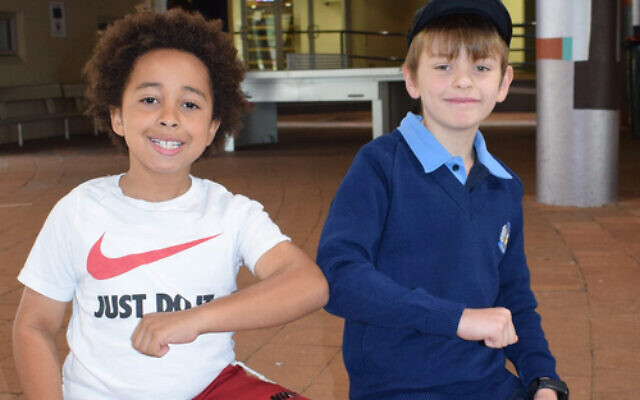Back to school … and shule
There are signs that Jewish life as we knew it before COVID-19 is finally returning, albeit on a very limited scale for now.

THE Sydney Beth Din (SBD) has issued guidelines for the recommencement of synagogue services in NSW, advising they reconvene under strict conditions on the first and second days of Shavuot (May 29 and 30).
The guidelines, issued on Wednesday afternoon, state that services will be made up of 10 people; anyone aged 70 and over may not attend; preference will be given to mourners and those commemorating yahrzeit; and each attendee will be required to wear a face mask and maintain social distancing at all times.
The statement also reiterates that minyanim are categorically not permitted in homes inside or outside.
#BREAKING The Sydney Beth Din has this afternoon issued guidelines for the recommencement of synagogue services in NSW,…
פורסם על ידי The Australian Jewish News ב- יום רביעי, 13 במאי 2020
The SBD said there is “absolutely no halachic allowance for engaging in communal prayer at the expense of a participant contracting or spreading a potentially life threatening illness such as COVID-19”.
“We are therefore obliged halachically to proceed with extreme caution in all areas, including the timing and frequency of shule services,” the statement said.
It added, “We believe that the success of these guidelines in protecting our community, will be only if we all abide by them uniformly.”
Despite the SBD’s guidelines, The Great Synagogue had planned to hold a Friday night Shabbat service for the first time in months this week after the government announced prayer gatherings of up to 10 people are permissible from tomorrow (Friday).
However, The Great’s Rabbi Benjamin Elton said on Thursday morning, “Unfortunately this Friday night did not prove possible, but we hope to be up and running very soon. Everything will be done safely and following government requirements.”
Emanuel Synagogue, which has been live-streaming services from different homes, will now begin doing so from its sanctuary with the rabbi, cantor and musicians making up the 10 allowed.
The SBD has also strongly recommended people use the COVIDSafe app, but as carrying a phone on Shabbat is forbidden, it recommends people compile a list of contacts after Shabbat.
Meanwhile, Jewish day schools are in the process of a phased return to the classroom amid national progress in containing COVID-19, with a range of restrictions to be eased.
Some Moriah and Mount Sinai College (MSC) year groups have already returned to the classroom with more to commence in the coming weeks, while Emanuel School, Masada and Kesser Torah Colleges (KTC) are set to begin a phased return next week.
In a booklet sent to parents, Moriah principal Rabbi Yehoshua Smukler said it was important to remain vigilant as students return to face-to-face teaching.
“Safety and hygiene protocols are in place to protect everyone in the school environment,” he said.
MSC principal Phil Roberts has urged parents keep unwell children at home with all year groups to be back by next week.
“We still have strict protocols in place for managing pick up and drop off and throughout the day an increase in cleaning and use of hand sanitising,” he said.
Emanuel School will welcome students back from Monday, May 18 on a rotational basis.
“A staged return will ensure that we are able to practise appropriate social distancing in classrooms and allow us to make decisions quickly and effectively,” principal Andrew Watt said.
Masada College will also begin a phased return from Monday.
“Social distancing measures, including temperature checks for every person on campus each day, will be in place to ensure the priority remains, as always, our staff and students’ health and safety,” principal Martin Tait said.
KTC years 11 and 12 return today, with other year groups to follow in the coming weeks.
“We are really excited to welcome back our students to the campus,” principal Roy Steinman said.
“Despite the inevitable protocols and procedures in place to create a safe environment for staff and students, nothing replaces the energy and vibrancy of face-to-face teaching and learning.”
But as students return to schools and shules look to resume, Jewish Emergency Management Plan (JEMP) medical sub-committee chair Richard Glass has warned that the easing of restrictions does not mean Australia has beaten the pandemic.
“The virus is still active in the community, highly contagious, more than capable of incapacitating those we love and, sadly, potentially lethal,” he said.
“We can’t allow the ‘flattening of the curve’ to give us a false sense of security – it was only achieved by the national lockdown, which is now being progressively lifted.
“Our community is particularly vulnerable given the high level of interaction and older average age so there is no room for complacency. We must remain hyper-vigilant and continue to practise hand hygiene, cough/sneeze etiquette, surface sanitisation, strict social distancing and – as hard as it might be – no handshakes, hugs or kisses.”
The JEMP medical sub-committee has prepared a set of guidelines which NSW Jewish Board of Deputies president and JEMP decision-makers group chair Lesli Berger communicated to rabbis and shule presidents on Thursday.
“The most important thing is making sure all shules are compliant with the law and secondly, that people are safe from a health perspective,” Berger told The AJN.
The guidelines include limiting numbers to the legally allowed 10, ensuring physical distancing and good hygiene, keeping a register of who is in attendance and ensuring anyone with symptoms of illness does not attend shule.
“It’s not advisable I suppose for a person if they’re in a vulnerable age group, or suffer some kind of comorbidity, to attend,” Berger added.
“We’re not out of the woods yet, that’s for sure. There’s a long way to go, we’re going to have to live our lives differently for quite a long time.”

comments